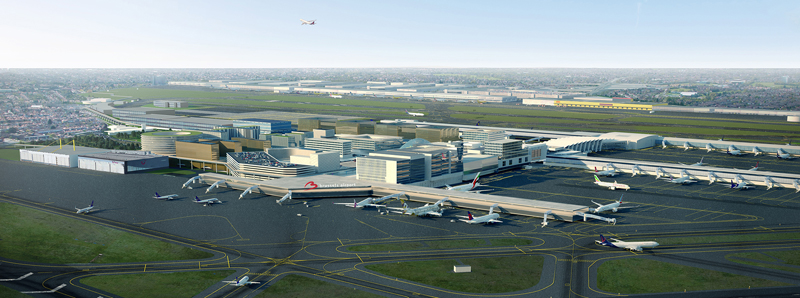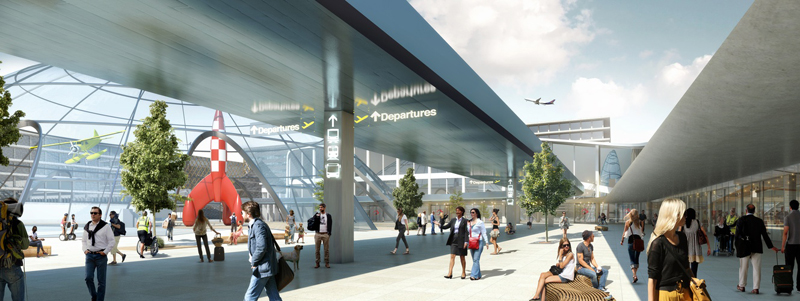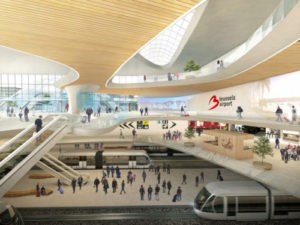
On 17 November 2016, Brussels Airport has presented its Strategic Vision 2040. The plan details the developments Brussels Airport has in mind to meet the expectations of its customers, passengers and air carriers, and to strengthen its competitive position in Europe and the rest of the world.
Main highlights of this plan include:
- Upgrade of the current runway infrastructure, by either an extension of the taxiway alongside runway 07R/25L, or an extension of the runway itself;
- Construction of two additional piers;
- Upgrade of Brucargo into a top-tier logistics centre to support the key sectors of the Belgian economy;
- Enhanced accessibility to the airport by transforming the airport into a key player as intermodal hub which will benefit the entire region;
- A prestigious state-of-the-art business centre.
Courtesy of this ambitious development plan, Brussels Airport is set to solidify its role as Belgium’s second economic growth hub. This will enable the number of direct and indirect airport-related jobs to go up from 60,000 today to 75,000 in 2020, 85,000 in 2025 and to as much as 120,000 by the 2040 horizon.

Forum 2040: setting up dialogue with all stakeholders
The Strategic Vision 2040 put forward by Brussels Airport starts from a balanced approach and takes into consideration the immediate and wider surroundings of the airport. “We are confident that it is feasible to increase the airport’s capacity to meet the growing market demand and, in doing so, ensure Belgium’s competitive position and connectivity, while at the same time taking account of the impact of this growth on local residents and the environment. The Forum 2040 which we are launching is the ideal platform to exchange ideas about this and find solutions”, Brussels Airport Company CEO Arnaud Feist stresses.
By setting up Forum 2040, Brussels Airport is looking to initiate transparent and structured dialogue with a group of airport users, local residents, the municipal authorities, civil society organisations, businesses and experts alike. Candidates can sign up to sit on the forum through the website www.brusselsairport2040.be. An independent jury will select around sixty participants based on their registered address or their expertise so as to make sure that all stakeholder groups are equally represented. The meetings of the Forum 2040, the first of which is to be held in late January 2017, will be presided over by an independent chairperson who will be appointed in early December.
In order to share its vision as transparently and as openly as possible with its environment, Brussels Airport is aiming at an open communication and constructive dialogue with the public at large. The launch of the Strategic Vision 2040 goes hand in hand with the launch of a dedicated website www.brusselsairport2040.be, a dedicated Facebook page and a magazine entitled “connect” to be distributed at 500,000 copies. The airport encourages everyone to put forward their questions through the various communication channels that are in place.

Improved infrastructure
In order to drive forward the airport’s activities, and in doing so, to uphold the connectivity and the economic growth of our country, the infrastructure of Brussels Airport will need to be adapted. This is planned from 2025 forward, after a first optimisation phase of the existing infrastructure by 2020.
- The runway infrastructure will need to be upgraded in order to step up capacity during peak hours and to ensure the same capacity under all weather conditions. To do so, the airport is looking at two options: either an extension of the taxiway alongside runway 07R/25L, or an extension of the runway itself.
- Two additional piers are to be built so as to improve traveller comfort: pier A West by 2023 and Pier C by 2030.
- The Brucargo zone will be turned into a top-tier logistics centre to support the key sectors of our economy, such as the pharmaceutical and the biotechnology industries. The success of these industries relies on a supply chain of efficient and high-performance transport infrastructure and storage facilities.
An intermodal hub for the region
 In the area of public transport, Brussels Airport has actively been working to enhance accessibility to the airport for many years, in association with national railway operator NMBS/SNCB and regional public transport companies De Lijn and MIVB/STIB. In the future, the airport will be a key player as intermodal hub which will benefit the entire region. As such, more trains, more buses and a new link with the regional tram network are now firmly on the agenda. By 2040, the aim is to see 50% of all passengers and airport staff travel into Brussels Airport by public transport or by bike. The concentration of all these transport modes at a strategic location will enable Brussels Airport to contribute to more fluent traffic flows around Brussels and in the Brussels Periphery.
In the area of public transport, Brussels Airport has actively been working to enhance accessibility to the airport for many years, in association with national railway operator NMBS/SNCB and regional public transport companies De Lijn and MIVB/STIB. In the future, the airport will be a key player as intermodal hub which will benefit the entire region. As such, more trains, more buses and a new link with the regional tram network are now firmly on the agenda. By 2040, the aim is to see 50% of all passengers and airport staff travel into Brussels Airport by public transport or by bike. The concentration of all these transport modes at a strategic location will enable Brussels Airport to contribute to more fluent traffic flows around Brussels and in the Brussels Periphery.
A business centre to attract new businesses
By 2040, Brussels Airport is looking to establish a prestigious state-of-the-art business centre to accommodate even more companies keen to set up office close to the airport. Today, leading companies of world renown such as Deloitte, KPMG and Microsoft have already decided to occupy premises at Brussels Airport, attracted by the mobility and connectivity benefits. Over the years ahead, this trend will only continue to gather momentum, as seen at other airports around the world.
For further details: www.brusselsairport2040.be
Photos: copyright © Brussels Airport
